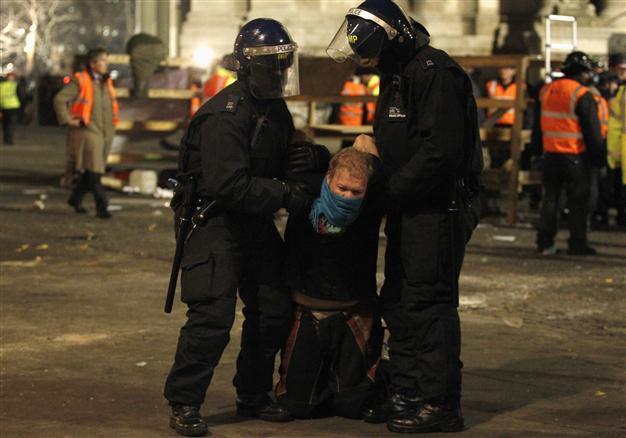Police dismantle Occupy London camp
LONDON - The Associated Press

A protester is detained by the riot police after being removed by bailiffs from the last remaining structure of the Occupy encampment outside St Paul's Cathedral in London February 28, 2012. REUTERS Photo
Police and bailiffs dismantled Occupy London's campsite outside St. Paul's Cathedral early today, clearing one of the longest-surviving encampments inspired by the New York protest against capitalist excess.The protesters said vans loaded with police arrived at the site just before midnight.
The local authority, the City of London Corporation, confirmed the eviction was under way by bailiffs, backed by police.
"We regret that it has come to this," the corporation said in a statement, asking protesters to move on peacefully.
Civic authorities have an eviction order allowing them to remove the activists' tents, though not the protesters themselves.
There appeared to be several dozen protesters at the site, down from hundreds at the height of the camp.
As bailiffs in fluorescent jackets dragged tents and their contents to waiting trucks and dumpsters, there was little of the violence that has accompanied the clearance of several Occupy sites in the U.S.
Some protesters attempted to wear their tents as clothing and others used wooden pallets to form a barricade. Police in riot gear formed lines nearby, but there were no immediate reports of arrests.
Demonstrators said the end of the camp would not mean the end of the Occupy movement.
"It's only tents and materials the injunction applies to so I think some protesters will be back here tomorrow," said Gary Sherborne, 50.
Protesters inspired by New York's Occupy Wall Street movement have been camped outside the 300-year-old church since mid-October.
They say they are exercising freedom of speech and drawing attention to a warped capitalist system that spawned a global financial crisis.
Local authorities claim the camp has harmed nearby businesses, caused waste and hygiene problems, and attracted crime and disorder.
Last week, a court rejected the protesters' challenge to the eviction order, ruling that the right to protest did not justify a semi-permanent camp on a public pathway.
The protesters set up camp outside the cathedral after they were prevented from camping in front of the nearby London Stock Exchange.
Their proximity to Christopher Wren's architectural icon embroiled the church in a conflict between bank-bashing protesters and the city's finance industry. The church's position on the protesters has shifted several times, and the cathedral's dean and a senior priest both resigned over the crisis.

















